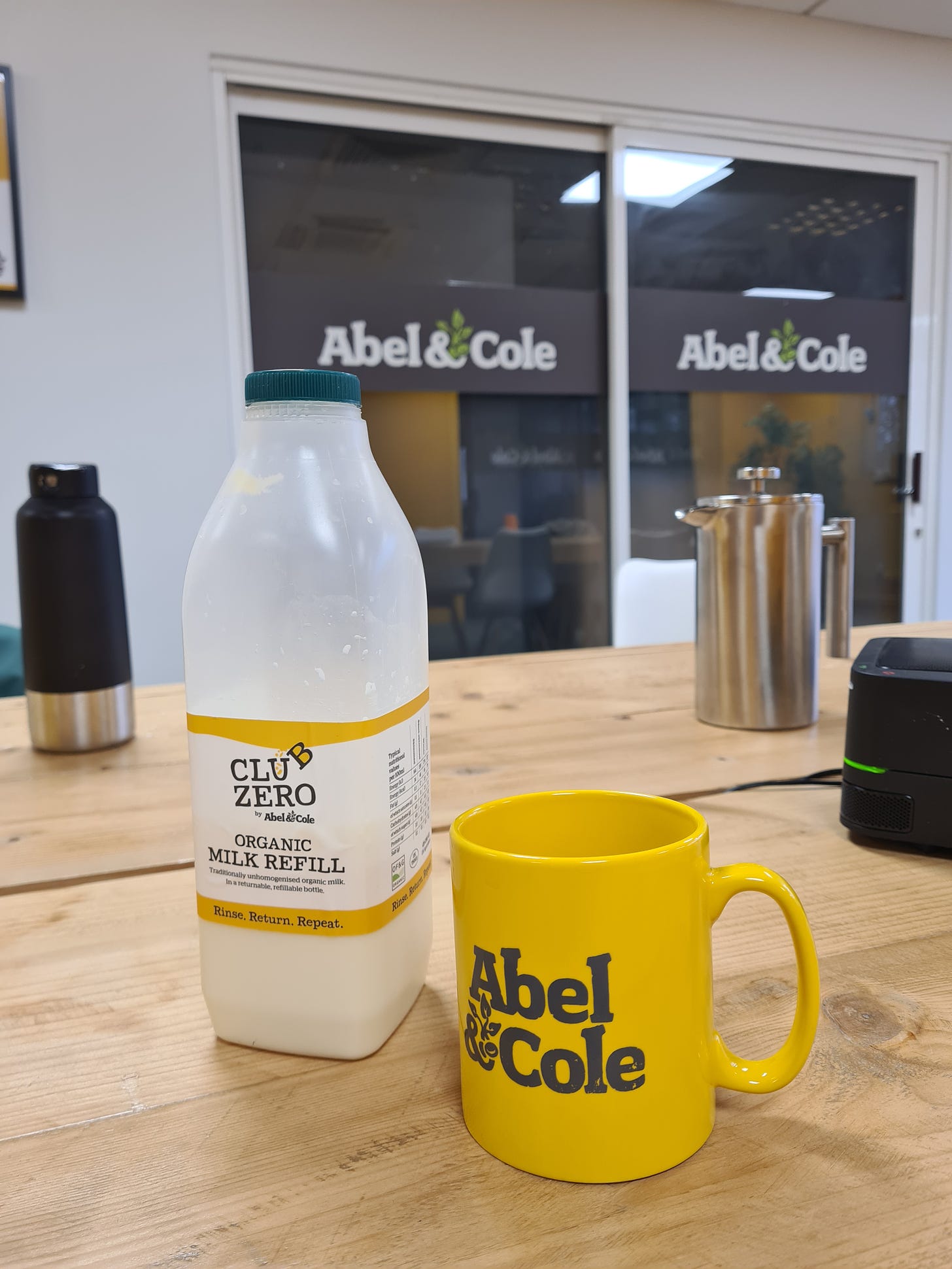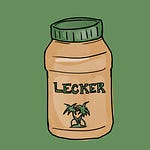Welcome back to Out of the Box, an exploration of what surrounds our food. That is, the containers and packaging that it enters our lives in. In this series, I'm talking to people who have taken an interesting and innovative approach to packaging what they cook and produce, as well as exploring some of the broader context around the history of particular food packaging, as well as, obviously, waste and the impact that food packaging has on our environment.
I'm back after a couple of months break to rest and recuperate, and while I was away, I have some really interesting conversations about packaging that I'm excited to bring to you. One of the types of packaging I feel like I'm confronted with most physically in my own home is milk bottles. Even though there's only two of us in my household, I feel like the plastic really just piles up.
I obviously recycle the bottles, but It feels like there's a better way. Shouldn't we be going back to the milk rounds of yore? As soon as I started researching this topic, I very quickly started getting some very well targeted Instagram ads for Abel & Cole and their Club Zero milk delivery service.
Club Zero is actually a branch of Abel and Cole's business that applies to over a hundred products which, like Abel and Cole's veg boxes, can be delivered to your front door in pre filled packaging and you simply leave it out the next week to be returned along with your box. They're now delivering milk to thousands of people in refillable, returnable containers.
But it turns out it was a pretty complicated process to get to this point. I met Abel and Cole's sustainability lead Hugo Lynch, who has been a major part of launching Club Zero, to talk about all of this and some of the backstory. as well as the challenges of rethinking milk packaging in this way. We were also in the room with Holly Bradley, Abel and Cole's PR manager, who along with Hugo, had very kindly rescued me from the riverbank path when I couldn't follow a series of very simple directions to their HQ in Wimbledon.
You can listen to the audio via the player above and the transcript is below.
We talk a bit more generally about sustainability in products and packaging to begin with, and then we get a bit more specific about milk bottles in the second half of the conversation.
Hugo: I'm Hugo Lynch. I'm the sustainability lead at Abel & Cole. And alongside the rest of my team, we work across the spectrum of everything we do at Abel & Cole. And Abel & Cole is an organic grocery working online. We're direct to customer, which gives us a kind of unique position in the retail market because we have a little bit more control over packaging in particular.
I've gone straight into packaging. I should maybe go back to the organic thing first. So we started in 1989.
Lucy: I didn't realize it was that long.
Hugo: It's been quite a long time. Yeah. I, to be honest, I'm, I mean, I've only been here for three years. A lot of people have been here for like 20 years. It is that kind of business.
And. I, I cannot fathom what that amount of time is like, but it's obviously a very nice business to work for. I think they've seen a lot of changes over that time. It was started in South London in Brixton as a, um, as an organic delivery service direct to, to people in the local area. We're sitting in our head office in Wimbledon, which was a big move up, I think in, I'm not going to say the date, and I'm looking at Holly, who has been here for less time than me, so between the two of us we definitely don't know.
Lucy: At some point.
Hugo: At some point we made a move to here, which was actually our distribution centre, when it started to grow, but we now don't, we don't distribute from here, or pack in here.
Our main operation is out in Andover and the way that we get things to customers is we obviously receive orders online. We pack everything the day before the delivery in Andover. It's transported on intersite lorries to our nine distribution centres and we own our own delivery fleet. And that allows us to do a lot of return transit. It's backhaul logistics, which is, is slightly different. Well, completely different to, to how the majority of retailers do their direct customer deliveries.
So if you do Tesco home delivery, for example…actually Tesco is a bad example, but some, but some, some supermarkets will, will outsource the deliveries when that's that kind of thing starts to become more popular. They really wanted to offer timed delivery slots. And we have the….well, we were kind of sticks in the mud, I guess. And we decided not to offer that to customers.
We wanted to optimise...for carbon there was a decision to say, we don't want to, you know, to do these timed delivery rounds, send the drivers going all over the place, emitting more CO2 from the vans and being just like completely inefficient with the fuel. But as a result, because the drivers go on a round, like a milk round, we're able to collect back the transit packaging that the customers receive the product in. And that's kind of been one, it's been one of the real selling points of our business model for a really long time. And our customers are really bought into it.
And in 2020, we launched a refill product range Club Zero, which we launched in 2020, about two or three months before the pandemic hit. So it was, it was a little, yes, well, yes, but we did actually have to stop doing it during the pandemic because we had a There were a lot of supply issues and we actually had a huge amount of increased demand to pack, um, pack fruit and veg.
So that was, that was sort of parked for about a year. And then it was restarted again in 2021. And we started to really put some investment into it at that time. And we've had a lot of growth in that range. We've expanded it from just your sort of basic pantry items to include household cleaning more sort of treat oriented food I mean still mostly dried foods, but once we started transporting the household cleaning products around and liquids.
We then launched with a plant based milk. That's from a third party. So that's sort of… it's completely separate to us in a way, but we were able to operate that return logistics for them. And that, that was kind of the opening to finally do this project with milk, which had been talked about for probably five years to introduce a refill scheme for milk because customers were interested, have always asked us about about packaging and milk is so…it's so visible.
It's also a very popular product and also everybody knows what the alternative is. Everybody has experience with a milk round, even people who have maybe too young to have actually had one know the lore, right? They know of it. So I think everybody knows what the concept of it is. So that's…but, they, I mean, I guess we'll get to it, I feel like I'm I'm just doing a monologue! Yeah, there are some challenges that limit that, uh, the ability to do that. Yeah.
Lucy: Okay. Well, we can definitely talk about those challenges, I'm very interested. But yeah, I guess before we get into that, um, what was kind of the response like when you started the Zero scheme kind of from scratch? Was it, was it something that people embraced straight away?
Hugo: It was something our customers had been asking for. And I think when it was first implemented. It was seeing the increased demand for these types of schemes, looking at refill shops and the high street presence of these kinds of refill delis or corner shops. And they do a really great job. And it was interesting actually looking at the product selection.
You know, I mentioned we do all these dried goods. It's quite difficult. When you look at how they specialise versus how a bigger retailer can operate. Because I think some of the things that are really high value at a refill shop are things like mill your own peanut butter or pour yourself a glass of wine or, um, fill up your own container. Like with the Ecover, for example, those kinds of refills. It's very difficult with liquid.
So we just, we stayed away from that completely. We started with the staples and we had immediate interest in it, but I think probably from the kind of hardcore people who really wanted this, although it's difficult to say because obviously we stopped after about three months at the beginning.
But then when we restarted, our strategy was to just try and get more and more things in there to make it exciting for people and to make it, a bigger shop that represents more and more and more of what you buy from us. So we've had really positive response. It's not the majority of our customers, but it's had really significant growth over the last three years.
It started with about 13 products in the range. We now have over a hundred products. It is interesting again in terms of how our customers interact with us because all of our products are available on subscription. So you don't actually have to think about what you're going to buy. You can just let your box roll over.
So it's really a question of getting people to want to look at it and to offer them things that they want to buy. And you're limiting yourself and the customer. If you say we only sell rice and rice and pasta and, you know, the more things you can bring in there and sort of mix it up and, and keep people interested.
That's how you encourage this behaviour change. And it fundamentally is a kind of dialogue with the customer that the retailer has to have because we need the packaging back to make this work. So we need the customers to be buying it regularly and to keep shopping from us because if they don't, then it just sits in their house.
Lucy: Yeah.
Hugo: Yeah. And that's kind of the, the risk of it, but we've, we've reached a kind of a, a happy place with it now.
Listen to this episode with a 7-day free trial
Subscribe to Lecker to listen to this post and get 7 days of free access to the full post archives.









